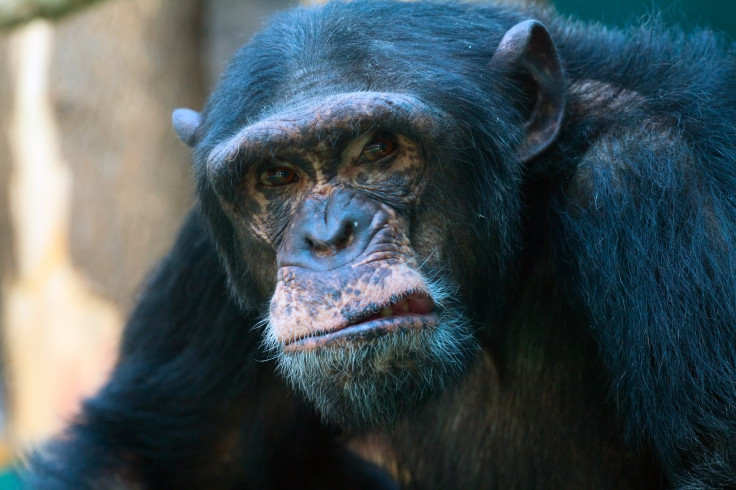Chimpanzee Wars Not Humans' Fault, May Be Proof Of Similar Innate Penchant For Violence

Humans have ruined so many aspects of nature, it’s actually hard to keep track. We’re responsible for everything, from bats that fly during the day to whales that purposely swim onto shore. In this mess of man-made destruction there is one piece of good news, however. According to a recent study, chimpanzees’ penchant for violence actually has nothing to do with humans disturbing their environment. But the fact that they’re on the endangered species list, yeah, that’s still on us.
Not that it should be any source of pride, but humans and chimpanzees are some of the only species on Earth that engage in coordinated attacks on other members of their species. These "chimpanzee wars" were first documented by renowned primatologist Jane Goodall. This practice was long believed to be sparked by human influence, according to a press release.
"Humans have long impacted African tropical forests and chimpanzees, and one of the long-standing questions is if human disturbance is an underlying factor causing the lethal aggression observed," explained co-author Dr. David Morgan, research fellow with the Lester E Fisher Center for the Study and Conservation of Apes at Lincoln Park Zoo in Chicago. Human destruction of chimp habitat was believed to contribute to food and mate shortages, which in turn caused chimps to, essentially, have long and bloody “wars” amongst each other.
If the guilt of your contribution to chimp revolutions was keeping you up at night, you can now rest easy. Researchers from the Lincoln Park Zoo in Chicago have disproved this long accepted theory. After studying the majestic animals in their natural habitat for many years, Morgan concluded that “human influence does not spur increased aggression within or between chimpanzee communities.”
What’s most disturbing is how the chimpanzees' war trends seemed to closely reflect that of man. For example, data collected from 18 chimp communities studied for 50 years showed that, like in humans, males are the most aggressive of the sexes and most acts of violence are “driven by adaptive fitness benefits.” These results fit in line with Christopher Boehm’s hypothesis that human levels of aggression were comparative to chimpanzee rates, suggesting that violence and aggression are innate rather than learned.
The researchers hope their findings could be used to better protect both chimps, which have seen a population drop of nearly 90 percent in the last 20 years. “The more we learn about chimpanzee aggression and factors that trigger lethal attacks among chimpanzees, the more prepared park managers and government officials will be in addressing and mitigating risks to populations particularly with changing land use by humans in chimpanzee habitat," Morgan concluded.
Source: Nature. 2014.



























